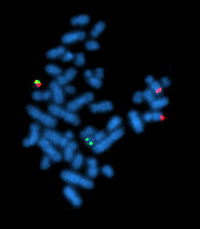
Photo from wikipedia
Abstract Context Resistance to BCR-ABL tyrosine kinase inhibitor (TKI) is the cause of treatment failure in blast phase chronic myeloid leukaemia (BP-CML). Agents that act synergistically with BCR-ABL TKI are… Click to show full abstract
Abstract Context Resistance to BCR-ABL tyrosine kinase inhibitor (TKI) is the cause of treatment failure in blast phase chronic myeloid leukaemia (BP-CML). Agents that act synergistically with BCR-ABL TKI are required to improve response. Objective This work investigated the effects of stachydrine in CML. Materials and methods CML cells were treated with control or stachydrine at 20, 40 and 80 µM. Proliferation and apoptosis were examined after 72 h treatment. Combination studies were performed in four groups: control, TKI, stachydrine and the combination of stachydrine and TKI. Immunoblotting analysis was performed in CML cells after 24 h treatment. Results Stachydrine inhibited K562 (IC50 61 µM), KCL22 (IC50 141 µM), LAMA84 (IC50 86 µM), Ba/F3 T315I (IC50 26 µM), Ba/F3 WT (IC50 22 µM) and KU812 (IC50 35 µM) proliferation, and induced apoptosis in these CML cell lines. Stachydrine significantly induced apoptosis, inhibited colony formation and self-renewal in BP-CML CD34+ cells. The combination index of stachydrine and TKI combination was <1. Compared to TKI alone, the combination of stachydrine and TKI significantly induced more apoptosis and decreased colony formation in BP-CML CD34+ cells. Stachydrine decreased phosphorylation levels of multiple receptor tyrosine kinases in CML cells. Discussion and conclusions Our study is the first to demonstrate (1) the anticancer activity of stachydrine on primary patient cancer cells; (2) the inhibitory effects of stachydrine on cancer stem cells; (3) the synergism between stachydrine and other anticancer drugs.
Journal Title: Pharmaceutical Biology
Year Published: 2022
Link to full text (if available)
Share on Social Media: Sign Up to like & get
recommendations!